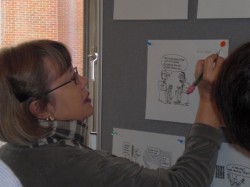Deciding learning outcomes
 In designing your learning event, think carefully about the purpose and expectations, and how these fit the needs of learners and relates to their individual roles and objectives, and those of the groups and organisations they may be a part of. It is a good idea to define the intended ‘learning outcomes’ clearly in advance, and with others. This should be done at the design stage by the facilitator and other relevant stakeholders, where possible including the learners or some of their representatives.
In designing your learning event, think carefully about the purpose and expectations, and how these fit the needs of learners and relates to their individual roles and objectives, and those of the groups and organisations they may be a part of. It is a good idea to define the intended ‘learning outcomes’ clearly in advance, and with others. This should be done at the design stage by the facilitator and other relevant stakeholders, where possible including the learners or some of their representatives.
Allow time for dialogue so that the event can be well-designed and in keeping with the agreed aims. Learning outcomes and expectations can also be fine-tuned with learners at the beginning of the event, and as a way of checking on progress midway or when evaluating at the end. Being clear about outcomes, hopes and expectations can avoid confusion and improve the experience for everyone.
At the same time, this should not prevent facilitators from improvising, adapting and bringing in elements of surprise. Remember that learning can’t always be measured during or even at the end of an event, as the learning process often takes time to settle and ‘click’ through reflection and practice.
Sample Learning Outcomes
Some possible outcomes for learners in events using this guide are as follows [adapted from the Empowering Society course for MA students at IDS (2002-present) and from Irene Guijt and Jet] but these should be selected and adapted to each context:
- to gain a deeper awareness and understanding of different meanings of power in relation to work for personal, organisational, social or political change (e.g. the Power Cube, other concepts and frameworks of power; the kind of change desired can also be made more specific)
- to explore the implications of these meanings and frameworks of power for individual and group / organisation actions and practice
(e.g. implications for professional roles and behavior, organisational policy, programme strategy, political goals, relationships with other actors, communication, planning, evaluation; influencing; etc.) - to become familiar with and begin to apply specific concepts, methods and tools for understanding and engaging with power in practice (e.g. frameworks, tools and methods of power analysis, reflective practice, mapping actors/issues, ways of inquiring into power with others, etc.)
- to be able to identify feasible steps, individual or collective, to enhance the possibilities and scope for bringing understandings of power into practice (e.g. setting individual, group or organisational aims and plans, examining current assumptions and ways of working, making action plans, etc.)
While the focus of the above examples of learning outcomes is on power, in adapting these you may need to link the outcomes and the power theme to other concerns and objectives (e.g. rights-based approaches, citizen or civil society participation, advocacy, organisational change) and in relation to particular issues (e.g. the power and influence of a marginalised group in society such as youth, ethnic minorities, women; issues of HIV-AIDS; participation in local governance; natural resource management; livelihoods; climate change, etc.).

